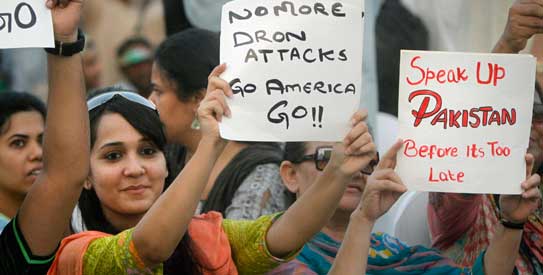
ISLAMABAD: Campaigners condemn US drone strikes in Pakistan as extra-judicial assassinations that kill hundreds of civilians, but popular protests against them are conspicuous by their rarity.
Opinion polls suggest barely nine per cent of the Pakistani public support the strikes, and anti-Americanism is rife in the country of 180 million people, a key ally of Washington in the war on terror.
Even so, rallies protesting the CIA-run operation against Taliban and al Qaeda allies in Pakistan's tribal areas on the Afghan border are few and thinly attended.
The government says 30,000 people have been killed in attacks across Pakistan in the last decade - 10 times the 3,000 people who perished in the September 11, 2001 suicide hijackings in the United States.
Cricket hero turned politician Imran Khan, a staunch critic of US policy in Pakistan and the “hypocrite” government in Islamabad, led an anti-drone demonstration on Friday but only around 2,000 people joined him.
Earlier in the week, Khan was among the speakers at a press conference in Islamabad where lawyer Shahzad Akbar held up a piece of twisted, rusting metal.
“These are the remains of a drone missile fired in August 2010 in Datta Khel, North Waziristan,” he said.
“It killed the wife and two children of a local tribesman, Bismillah Khan. This proves the US wrong when they say no civilians are killed by their drones.”
Akbar is backed by British-based charity Reprieve, whose founder and director Clive Stafford Smith said drone strikes were “in violation of the laws of war and Pakistan sovereignty”.
But behind the politics, security officials say the issue is not so simple.
Campaigners struggle to win public sympathy for people killed in remote mountains, difficult to access and often under rebel control.
The United States says the area, particularly the districts of North and South Waziristan, is infested with Taliban and al Qaeda allies who need to be eliminated to protect US soldiers in neighbouring Afghanistan.
The Pakistani military is itself battling a Taliban insurgency in the northwest, and more than 4,700 people have been killed in attacks across the country since government troops stormed a radical mosque in Islamabad in 2007.
The drone strikes have cleared many Pakistani Taliban from the battlefield, including its main founder Baitullah Mehsud in 2009.
“Imran Khan and others are demonstrating against drones and their victims. But can any of these people go to North Waziristan and come back alive?” said one Pakistani source close to senior security officials.
US cables leaked by WikiLeaks showed that the government privately acquiesces in the drone strikes, even if it does not pay to say so in public.
“The Pakistani army supports drone strikes because they are efficient for eliminating TTP (Taliban) people... and give it a good reason not to start a dangerous offensive in North Waziristan,” one military official told AFP.
The military and the general public distance themselves from the tribes of Waziristan, seeing them as ferociously independent and ultra-conservative with a heavy concentration of Taliban in their ranks.
“People don't want to start a war to protect tribes whose members put bombs in the country,” said a Pakistani security official.
Estimates of the drones' casualties vary hugely. Western researchers believe around 300 attacks have killed 1,700 to 2,860 people since 2004.
Akbar, who sued the CIA a year ago demanding compensation on behalf of strike victims, says 80 per cent of those killed are civilians.
The Pakistani authorities say it is more like 10 per cent. The non-partisan New America Foundation think tank puts the figure at 20 per cent.
The London-based Bureau of Investigative Journalism said in August that 775 civilians could have been killed since 2004, including 168 children.
Even if the victims are proven to be fighters, “killing people that way is a violation of state law, they deserve at least a trial”, said Akbar.
Saifullah Khan Mehsud, director of the Fata Research Centre, a think tank devoted to tribal belt issues, says the drone strikes cause mental health problems and are widely reviled there, but that there is no culture of protest.
“They think all this is a game between Pakistan and foreign agencies. So their attitude is to stay away from war on terror issues. It is not a culture of demonstration there,” he told AFP.
“Only activists from right-wing parties demonstrate, because it's a violation of national sovereignty, so they have to say something.”











































